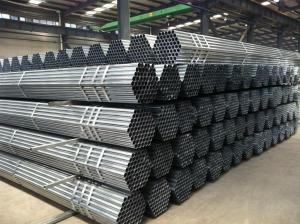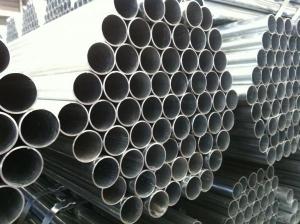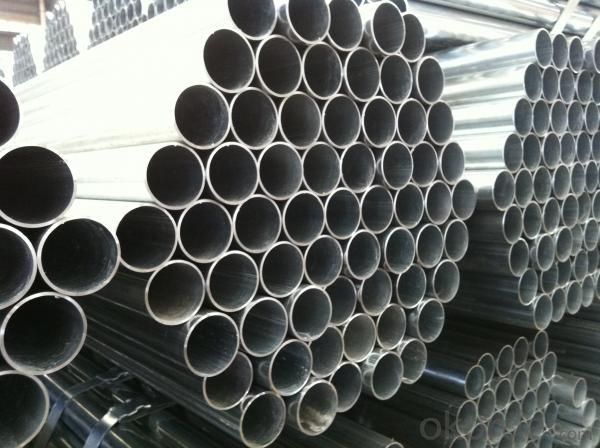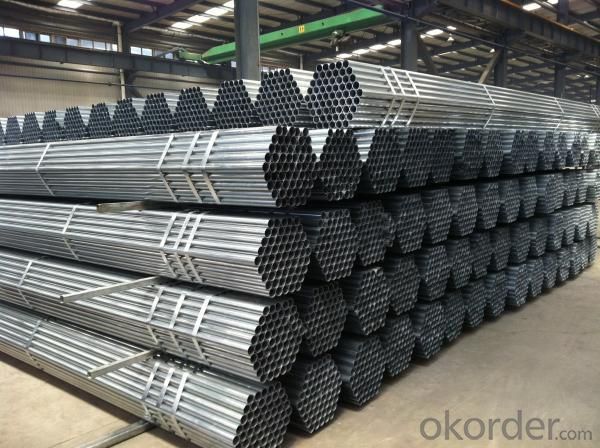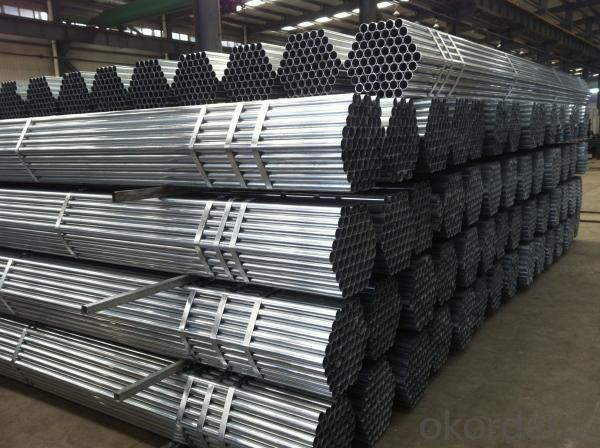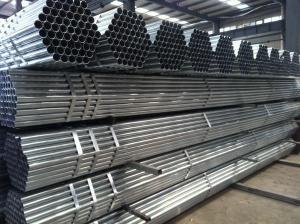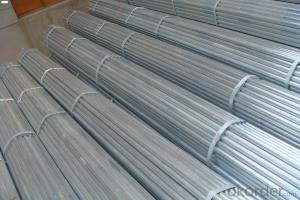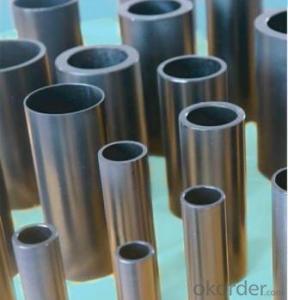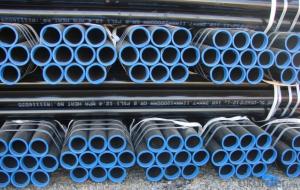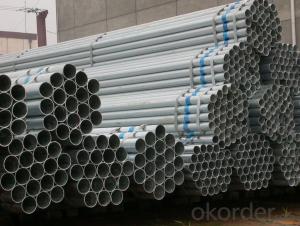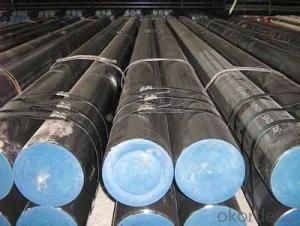Q345 Pre-Galvanized Pipe
- Loading Port:
- Tianjin
- Payment Terms:
- TT or LC
- Min Order Qty:
- 50MT m.t.
- Supply Capability:
- 5000 Tons Per Month m.t./month
OKorder Service Pledge
Quality Product, Order Online Tracking, Timely Delivery
OKorder Financial Service
Credit Rating, Credit Services, Credit Purchasing
You Might Also Like

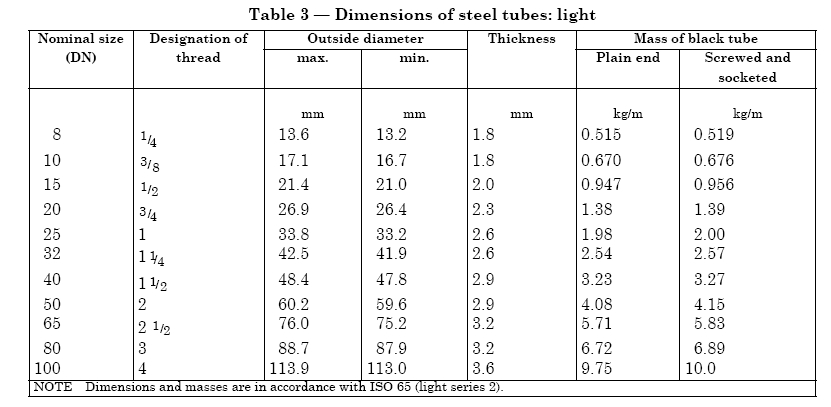
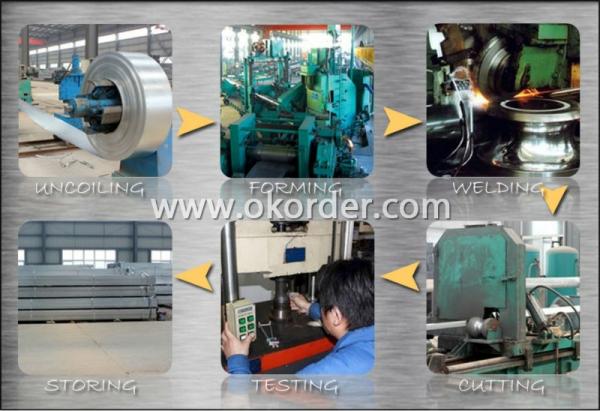
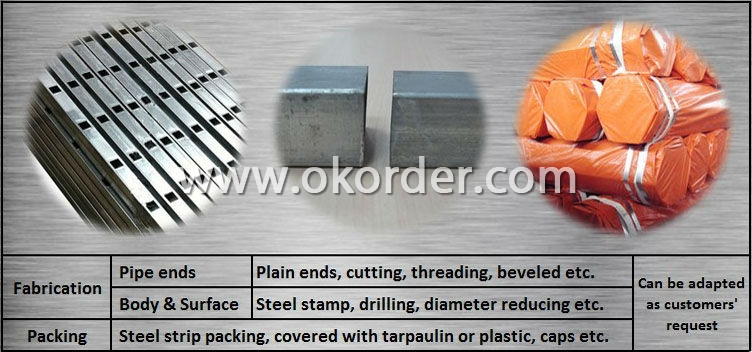
- Q: Can steel pipes be used for hydropower systems?
- Yes, steel pipes can be used for hydropower systems. Steel is a durable and strong material that can withstand high pressure and corrosion, making it suitable for carrying water or other fluids in hydropower systems. Additionally, steel pipes can be customized to different sizes and shapes, allowing for efficient water flow and distribution within the system.
- Q: How do steel pipes handle extreme weather conditions?
- Steel pipes are highly durable and can withstand extreme weather conditions. They have excellent resistance to corrosion, which allows them to maintain their structural integrity even in harsh environments. Additionally, steel pipes have high tensile strength, making them resistant to bending, cracking, or collapsing under extreme weather events such as strong winds, heavy snow, or intense heat. Overall, steel pipes are a reliable choice for handling extreme weather conditions.
- Q: What does "DN25 PN16" mean?
- Steel pipe DN25, PN16, first of all, for this annotation: pipe DN class, often used in welded pipe, such as welded pipe DN25. PN16 means pressure, that is, 16 kilograms (1.6MPa).
- Q: How can galvanized steel tubes be painted on the surface?
- The market is commonly used in alkyd iron red primer, iron red epoxy primer are not suitable for galvanized parts, otherwise it is easy to fall off. It is important to point out that the saponification of the galvanized sheet with alcohol, acid and paint will result in the failure of the coating and the damage of the original zinc coating.
- Q: How are steel pipes protected against abrasive wear?
- Steel pipes are protected against abrasive wear through various methods such as using protective coatings, lining the pipes with wear-resistant materials, or employing internal or external liners. These measures ensure that the steel pipes can withstand the erosive effects of abrasive materials and extend their lifespan.
- Q: What are the future trends in steel pipe manufacturing?
- Some future trends in steel pipe manufacturing include the use of advanced technologies such as robotic automation and artificial intelligence for increased efficiency and precision. There is also a growing focus on sustainability, with the development of eco-friendly manufacturing processes and the use of recycled materials. Additionally, there is a shift towards producing pipes with higher strength and lighter weight, as well as an increasing demand for customized products to meet specific industry requirements.
- Q: What is the difference between hot-finished and cold-finished steel pipes?
- Hot-finished and cold-finished steel pipes are distinguished by their manufacturing processes, resulting in different characteristics and uses. Hot-finished steel pipes are manufactured by heating a solid steel billet to a high temperature and then piercing it to create a hollow tube. This process is known as hot rolling. The hot rolling process ensures that the steel is malleable and can be easily shaped into the desired form. Hot-finished steel pipes have a rough surface and more rounded edges. They are typically larger in diameter and have thicker walls. These pipes are commonly used in applications that require high strength and resistance to pressure, such as in the oil and gas industry, structural projects, and heavy machinery. In contrast, cold-finished steel pipes are made through a process called cold drawing. This involves pulling the hot-finished steel pipe through a die at room temperature to reduce its diameter and achieve the desired shape. The cold drawing process provides a more precise and smoother finish to the steel pipes. Cold-finished steel pipes have a smoother surface and sharper edges compared to hot-finished pipes. They are generally smaller in diameter and have thinner walls. Cold-finished steel pipes are commonly used in applications that require precise dimensions, such as automotive parts, construction components, and machinery manufacturing. Overall, the main difference between hot-finished and cold-finished steel pipes lies in their manufacturing processes, resulting in variations in surface finish, dimensions, and applications. Hot-finished pipes are suitable for high-strength and pressure-resistant applications, while cold-finished pipes are ideal for precise dimensions and smooth surface requirements.
- Q: How are steel pipes used in the construction industry?
- Steel pipes are extensively used in the construction industry for a wide range of applications. They are primarily used for transporting various fluids and gases, such as water, oil, and natural gas, throughout the construction site or building. Steel pipes are also commonly used as structural elements in the construction of buildings, bridges, and tunnels, providing strength and stability to the structures. Additionally, steel pipes are utilized in the construction of plumbing systems, HVAC (heating, ventilation, and air conditioning) systems, and fire protection systems.
- Q: What is the fire rating of steel pipes?
- Several factors determine the fire rating of steel pipes. Steel possesses inherent fire resistance due to its high melting point and low thermal conductivity. However, the fire rating of steel pipes can be further improved by employing fire-resistant coatings or insulation materials. These additional measures can offer different levels of fire protection, typically quantified by how long the pipes can retain their structural integrity during a fire situation. The precise fire rating of steel pipes may differ depending on the thickness and type of coating or insulation employed. To ascertain the appropriate fire rating requirements for specific applications, it is crucial to refer to industry standards, such as those established by organizations like the National Fire Protection Association (NFPA), or consult with fire safety professionals.
- Q: How are steel pipes repaired if they develop leaks?
- Steel pipes can be repaired if they develop leaks through various methods such as welding, clamping, or using epoxy compounds. The specific repair technique depends on the size and location of the leak as well as the type of pipe, and it is typically carried out by trained professionals with the necessary equipment and expertise.
The main production and sale of galvanized steel, the thin-walled high-frequency welded pipe, galvanized pipe, square pipe, rectangular pipe, conduit, EMT conduit, greenhouse pipes, galvanized pipes, and other related products, annual production capacity of 40,000 tons. The company has independent export rights.
1. Manufacturer Overview
| Location | Tianjin ,China |
| Year Established | 2004 |
| Annual Output Value | Above 100milion rmb |
| Main Markets | Main land;Middle East;Southeast Asia |
| Company Certifications | ISO 9001 |
2. Manufacturer Certificates
| a) Certification Name | |
| Range | |
| Reference | |
| Validity Period |
3. Manufacturer Capability
| a) Trade Capacity | |
| Nearest Port | Tianjin;Qingdao |
| Export Percentage | 41% - 50% |
| No.of Employees in Trade Department | 21-50 People |
| Language Spoken: | English;Chinese |
| b) Factory Information | |
| Factory Size: | 38000squar meter |
| No. of Production Lines | Above 10 |
| Contract Manufacturing | OEM Service Offered;Design Service Offered |
| Product Price Range | High;Average |
Send your message to us
Q345 Pre-Galvanized Pipe
- Loading Port:
- Tianjin
- Payment Terms:
- TT or LC
- Min Order Qty:
- 50MT m.t.
- Supply Capability:
- 5000 Tons Per Month m.t./month
OKorder Service Pledge
Quality Product, Order Online Tracking, Timely Delivery
OKorder Financial Service
Credit Rating, Credit Services, Credit Purchasing
Similar products
Hot products
Hot Searches
Related keywords
